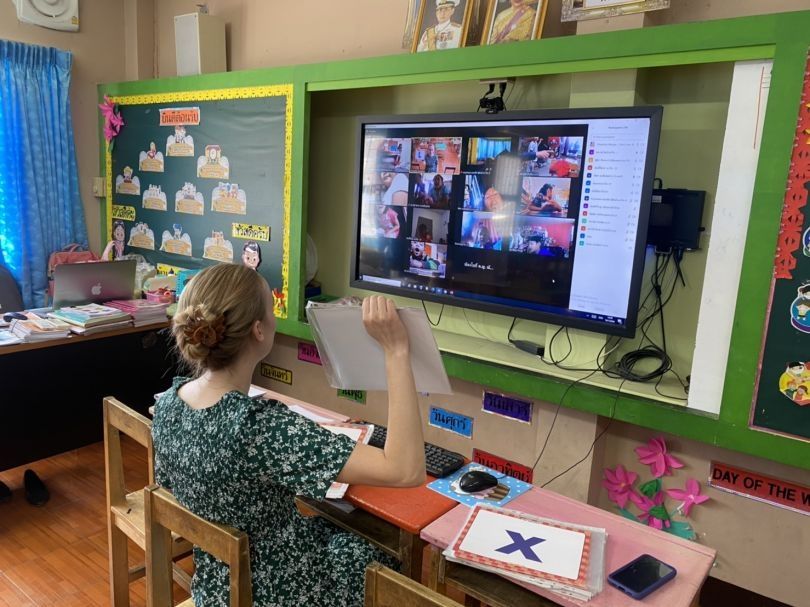Can You Teach English Without a TEFL Certificate?
Teaching English abroad has long been an exciting way to travel and see the world while gaining professional experience and funding said travels. And it's an especially exciting opportunity for those just graduating college or looking to take a break from their career before settling down.
But one of the very first steps to teaching English abroad is getting TEFL certified. A TEFL certificate is often one of the top requirements to teach English abroad around the world. However, not every destination or hiring school requires it. So if you're dreaming of teaching abroad, you're likely wondering—can I teach abroad without a TEFL certificate?
This guide breaks down everything you need to know about teaching without a TEFL, the good and the bad, so you can make the best decision for your teach abroad journey.
General Requirements to Teach English Abroad
While every teaching job will have different requirements, in general, to teach English abroad, you must:
- Be a native English speaker or have proof of near-native ability. Some countries even require teachers to have citizenship from the U.S., U.K, Ireland, Australia, Canada, New Zealand, or South Africa
- Have a reputable TEFL certificate with at least 120 hours of quality training
- Have a Bachelor's degree, although some ESL jobs hire teachers without college degrees
- Have relevant teaching experience, often preferred and not always required
- Submit a clean background check from a federal agency
Read more: 10 Best Countries to Teach English and Save Money
What is a TEFL Certificate?
TEFL stands for "Teaching English as a Foreign Language," and a TEFL certificate is formal training for aspiring English teachers. The best TEFL courses teach you cultural awareness, language teaching methodologies, English grammar rules, and how to plan effective and engaging lessons so you can overcome any challenges that may arise when teaching English abroad.
There are many TEFL certification options: online, in-person, or a combination of the two. However, the best TEFL certificates come from reputable brands, feature at least 120 hours of coursework, hold accreditation from trustworthy third parties, and are not suspiciously cheap.
Read more: How Much Should a TEFL Certification Cost?

Do I Need a TEFL Certification to Teach English Abroad?
No, you don’t always need a TEFL certificate to teach English abroad. However, it depends entirely on where you’d like to work, what level you’re interested in teaching, and your professional and educational background.
You may not need a TEFL certificate to teach English if you meet one or all of these qualifications:
- Possess a bachelor’s or master’s degree, especially if it’s in education
- Have 1-2+ years of previous teaching experience
- Hold other related qualifications like a CELTA, TESOL certificate, or teaching license
- Can show proof of work authorization in the country you’d like to teach English
- Your desired country doesn’t require teachers to have a TEFL certificate for a work visa
- Are a native English speaker
- And most importantly, the teaching job you’re interested in doesn't require it.
When should you get TEFL certified to teach English abroad?
Even if you meet one of the above requirements and the teaching job you’re interested in doesn’t require it, there are many situations where a TEFL certificate is not only beneficial but necessary.
You may need a TEFL certificate to teach English abroad if you:
- Do not have a college degree*
- Are not a native English speaker*
- Have zero teaching experience or experience with children
- Wish to teach somewhere that legally requires it for their work visa application
- Want to be successful in the classroom
- See teaching English as a future career or wish to teach English at the university level
*Getting TEFL certified is especially important for those without a college degree or who are non-native speakers. Most teaching jobs will require teachers to have a TEFL certificate in these situations.
Read more: Is a TEFL Certificate Worth It? How TEFL Can Advance Your Career at Home and Abroad
Where can you teach English without a TEFL Certificate?
While most teach abroad destinations require it, there are a few places where you can teach English abroad without a TEFL certificate, like Spain, Thailand, and Japan.

Spain
To teach English in Spain without a TEFL certificate, you need at least an associate's or a bachelor's degree to be considered for most positions. And while it’s possible to find a job without a TEFL, arriving in Spain with one can help you overcome many challenges. For example, a TEFL certificate helps teachers in Spain tackle cultural obstacles and seamlessly adjust to the educational system in the country.
Not to mention, the salary English teachers earn in Spain is often just enough to cover the cost of living. With a TEFL certificate on your resume, you make yourself more marketable as a private tutor, allowing you to attract clients and supplement your teaching income.
Two of the best ways to teach in Spain include the CIEE Teach Abroad in Spain program in Madrid, or the CIEE TEFL Job Placement Assistance in Murcia. These opportunities help place English teachers within the public school system in those regions each year.

Thailand
Teaching English in Thailand is another option for those without a TEFL certificate, however, it's not without its challenges. For example, English teachers must show proof of a college degree and be a native English speaker from native-speaking countries like the U.S., U.K., etc.
Additionally, those without a TEFL certificate are often subjected to low monthly salaries and may not have access to the best teaching positions and schools. A TEFL certificate not only makes you more desirable as a teaching candidate but helps you receive better pay.
TEFL-certified participants in CIEE's Teach Abroad in Thailand program reap the benefits of a more competitive salary that includes free housing.

Japan
One of the best-paid opportunities for those without a TEFL certificate can be found teaching English in Japan, specifically with the government-sponsored JET Program. However, you must meet other strict requirements, like having a bachelor's degree and a strong interest in Japanese culture.
But be warned, the JET program is extremely competitive, and only about 25% of applicants are accepted each year. And although a TEFL certificate is not technically required, one way to better your chances of acceptance is to demonstrate initiative and a desire for professional development with a reputable TEFL certification.
Read more: 8 Reputable Government Programs to Teach English Abroad

Teaching English Online Without a TEFL Certificate
It's also possible to teach English online without a TEFL certificate. Teaching English online has become a popular and competitive opportunity for native English speakers. Which means these platforms receive thousands of applicants interested in the freedom and flexibility that teaching English online can provide. A high-quality TEFL certificate makes it more likely you'll be offered the job and succeed at finding tutoring clients once established on the platform.
Some of the most popular online teaching platforms include:
- Cambly: One of the easiest places to get started as a newbie English teacher without a TEFL certificate, thanks to low requirements and teaching resources.
- SkimaTalk: An online teaching platform that helps adults from Japan and South Korea learn English.
- Preply: A place where teachers can teach students from across the world English and various other subjects.
- Verbling: A platform that hires teachers to teach over 70 languages online. Those without a formal teaching certificate must have previous experience to be considered.
Read more: How to Teach English Online and Earn Money at Home or Abroad

Disadvantages of Teaching Abroad Without a TEFL Certificate
Just because you can teach English without a TEFL certificate doesn't mean you should. That's because teaching without TEFL has many disadvantages, even if eligible for the teaching positions listed above.
When you teach English abroad without a TEFL certificate, you’re opening yourself up to:
- A lower salary compared to your TEFL-certified counterparts
- Fewer job prospects and the possibility that schools pass over your resume for teachers who have a TEFL certificate and, therefore, a more competitive resume
- Fewer options for where you can teach and countries where you’re eligible for a work visa
- Negatively impacting your students’ ability to learn
Benefits of Getting TEFL Certified
With the right TEFL course, you walk away a stronger, more confident teacher better equipped to help students successfully learn the English language.
Here are some crucial benefits of getting TEFL certified, even when you don’t technically need it:
- Meet and make lifelong connections with fellow teachers
- Gain a strong sense of confidence for your first day in the classroom
- Develop essential teaching skills like lesson planning, time management, English language teaching methodologies, etc.
- Brush up on English grammar so you can comprehensively explain rules to students
- Open the door to more exciting teaching opportunities abroad and better salary prospects.
Read more: 10 Life-Changing Benefits of a TEFL Certification

Learn More About CIEE TEFL’s 150-Hour TEFL Certification
If you're ready to make the most of your teach abroad experience, enrolling in a quality TEFL course is the first step. It's an essential requirement for most TEFL jobs and a must for learning the ins and outs of teaching English as a foreign language. It's especially beneficial for those who wish to teach English without a degree or who lack professional teaching experience.
CIEE TEFL's 150-Hour TEFL course is a fantastic jumping-off point for your professional career. That’s because the CIEE TEFL 150-hour course features:
- Course material accredited by ACCET, a trustworthy third-party recognized by the U.S. Department of Education.
- One-on-one feedback from a highly-qualified TEFL tutor.
- A mandatory 20-hour practicum providing hands-on experience in the classroom.
- Lifetime job search assistance.

